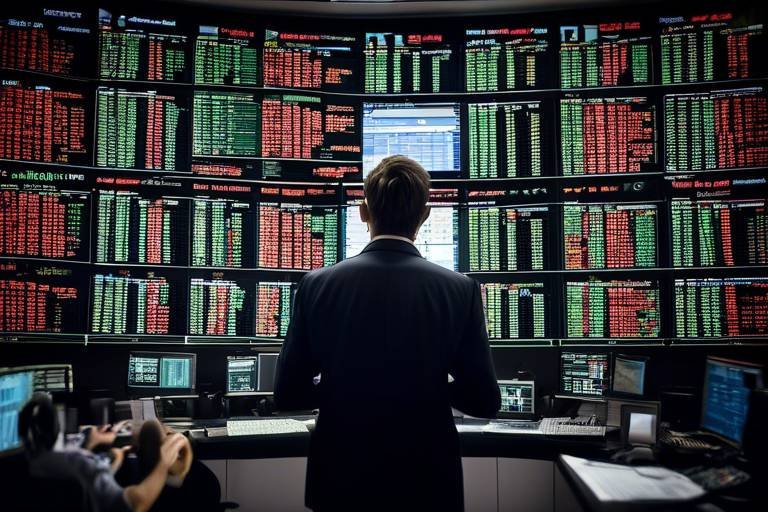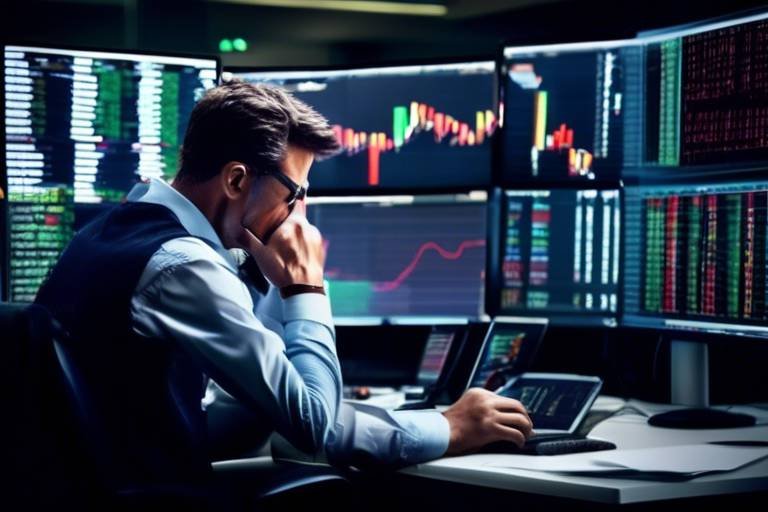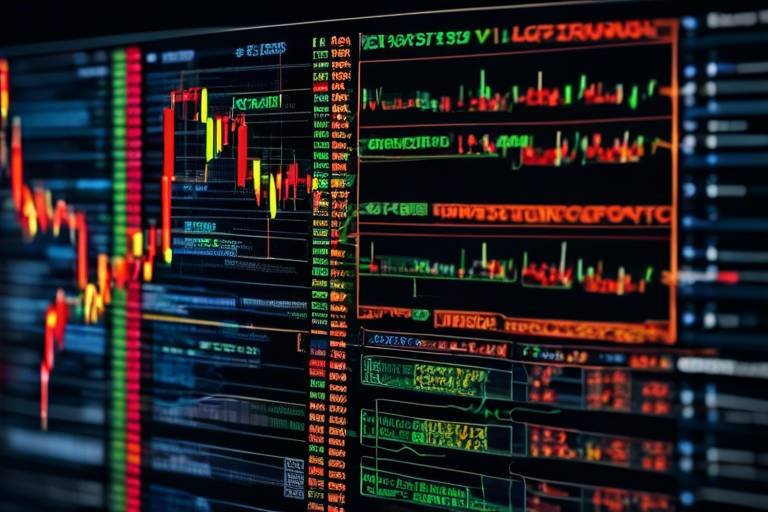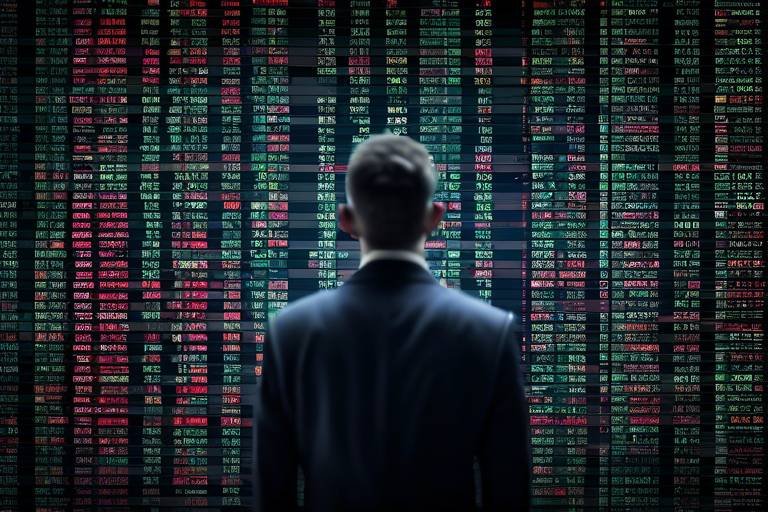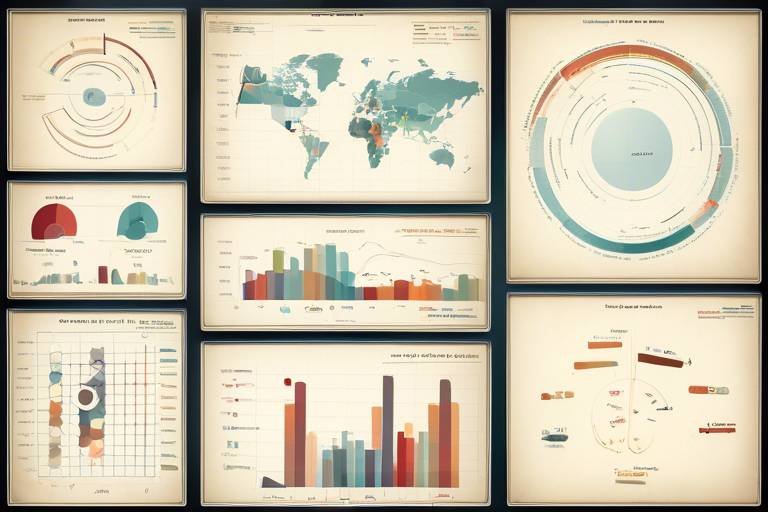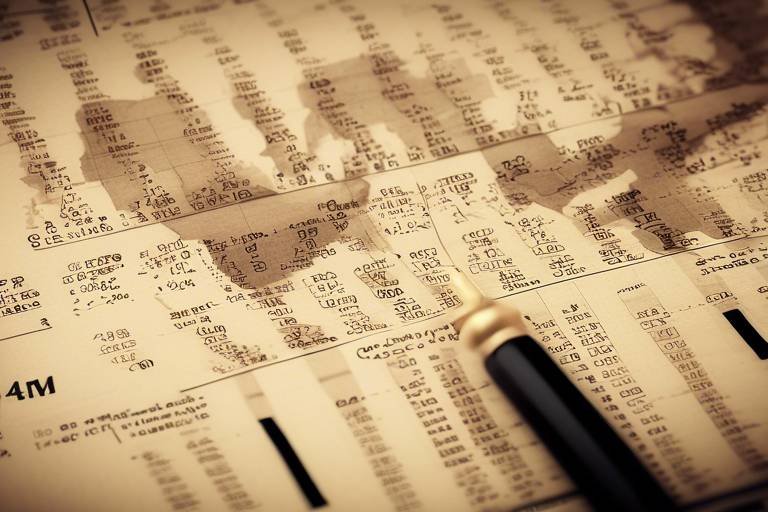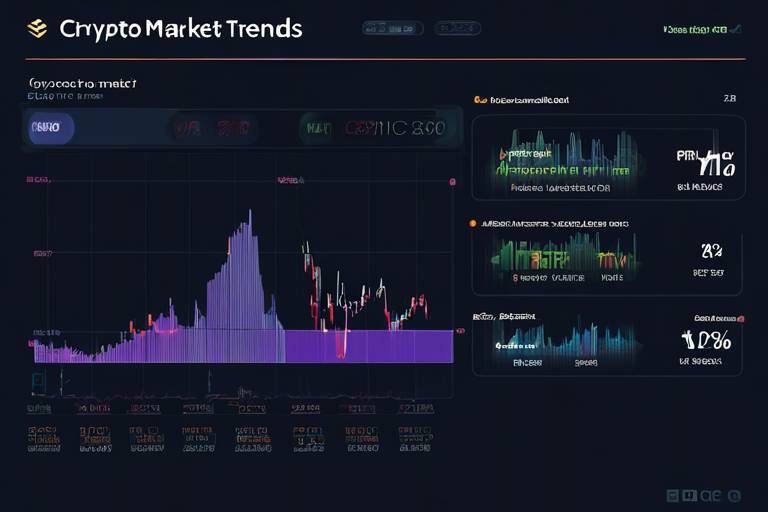Understanding the Role of Market Makers in Trading
In the bustling world of finance, market makers play a pivotal role that often goes unnoticed by the average investor. Think of them as the unsung heroes of the trading floor, tirelessly working behind the scenes to ensure that buying and selling securities is as smooth as possible. But what exactly do they do, and why are they so important? This article will explore the critical function market makers play in financial markets, their impact on liquidity, and how they facilitate trading for investors and institutions alike.
Market makers are financial intermediaries that provide liquidity by continuously buying and selling securities. They act as a bridge between buyers and sellers, making it possible for trades to occur without significant delays. Imagine a bustling marketplace where vendors are always ready to buy and sell goods; that's essentially what market makers do in the financial world. Their presence ensures that there is always a market for traders, making it easier for everyone to enter and exit positions as needed.
Understanding the operational mechanics of market makers helps clarify their role in trading. They quote prices, manage inventory, and use various strategies to balance supply and demand. When a trader wants to buy a stock, the market maker will sell it from their inventory, and when a trader wants to sell, the market maker will buy it. This continuous buying and selling keeps the market fluid and active. It’s like a dance where both partners must be in sync to create a smooth performance.
One of the most crucial concepts in market making is the bid-ask spread. This spread represents the difference between the buying price (bid) and the selling price (ask) of a security. For investors, understanding this spread is essential because it directly influences trading costs. A narrower spread often indicates a more liquid market, while a wider spread can signal lower liquidity and higher costs for traders. Essentially, the bid-ask spread is the market maker's way of earning a profit for providing their services.
Several factors can impact the bid-ask spread, including:
- Market Volatility: Higher volatility often leads to wider spreads as market makers adjust prices to manage risk.
- Trading Volume: Increased trading volume typically narrows spreads since more participants lead to greater competition.
- Asset Type: Different assets have varying levels of liquidity, which can affect the spread.
These factors can significantly affect market maker profitability, making their role even more complex.
To navigate these challenges, market makers employ various strategies to manage risk and ensure liquidity. Techniques such as hedging and algorithmic trading allow them to respond quickly to market changes. Hedging involves taking positions in related securities to offset potential losses, while algorithmic trading uses computer algorithms to execute trades at optimal prices. This adaptability is crucial for maintaining a stable market environment.
When comparing market makers to other market participants, such as brokers and institutional traders, their unique role becomes even clearer. While brokers facilitate transactions between buyers and sellers, market makers ensure that there is always a buyer or seller available. Institutional traders may hold large positions and can influence market prices, but market makers act to stabilize these fluctuations and maintain overall market efficiency.
Liquidity is essential for efficient trading, and market makers are crucial in providing it. Their presence ensures that buyers and sellers can transact without significant delays or price impacts. Without market makers, the market could become stagnant, leading to wider bid-ask spreads and increased costs for all participants. Think of liquidity as the oil that keeps the machinery of the market running smoothly; without it, everything can grind to a halt.
Market makers contribute to price stability by absorbing excess supply or demand. When there’s a sudden influx of sellers, market makers step in to buy, preventing extreme price fluctuations. This stabilizing effect fosters a more predictable trading environment, which is beneficial for all market participants. It’s like having a safety net that catches you before you fall, allowing for a more secure trading experience.
Regulatory frameworks govern the activities of market makers to ensure fair practices. These regulations are designed to protect traders and maintain market integrity. Understanding these regulations helps clarify market makers' responsibilities and the protections in place for traders. Just as traffic laws keep drivers safe on the road, these regulations ensure that market makers operate transparently and fairly.
The landscape of market making is evolving rapidly with technological advancements and changing market dynamics. As algorithms and artificial intelligence become more prevalent, the way market makers operate will undoubtedly adapt. Exploring these trends reveals how market makers will continue to play a crucial role in the financial ecosystem, ensuring that liquidity and efficiency remain at the forefront of trading practices.
1. What is a market maker?
Market makers are financial intermediaries that facilitate trading by continuously buying and selling securities, ensuring liquidity in the market.
2. How do market makers make money?
They make money through the bid-ask spread, which is the difference between the prices at which they buy and sell securities.
3. Why are market makers important?
They provide liquidity, stabilize prices, and ensure that there is always a market for traders, making the trading process smoother and more efficient.
4. What factors influence the bid-ask spread?
Market volatility, trading volume, and the type of asset being traded can all affect the bid-ask spread.
5. Are market makers regulated?
Yes, market makers are subject to regulatory frameworks designed to ensure fair practices and protect traders.

The Definition of Market Makers
Market makers are the unsung heroes of the financial markets, acting as crucial intermediaries that facilitate trading by providing liquidity. Imagine a bustling marketplace where buyers and sellers are eager to make deals, yet without someone to bridge their needs, transactions would stall. This is where market makers step in, ensuring that there’s always a buyer for every seller and vice versa. They do this by continuously quoting prices at which they are willing to buy (the bid) and sell (the ask) securities, thereby creating a vibrant trading environment.
To put it simply, market makers are like the glue that holds the market together. They take on the responsibility of holding an inventory of stocks, bonds, or other financial instruments. By doing so, they can quickly respond to market demands. When a trader wants to buy a stock, the market maker is there, ready to sell it. Conversely, if a trader wants to sell, the market maker is prepared to buy. This dual role helps maintain a steady flow of transactions and keeps the market functioning smoothly.
Market makers operate under a unique business model that enables them to earn a profit from the bid-ask spread. This spread is the difference between the price at which they buy a security and the price at which they sell it. For example, if a market maker buys a stock at $100 and sells it at $101, they pocket that $1 difference for each share traded. This mechanism not only provides them with income but also incentivizes them to keep the market liquid.
Additionally, market makers play a critical role in price discovery. They help establish fair market prices by constantly adjusting their bid and ask prices based on supply and demand dynamics. This process is akin to a dance, where the market maker must be in tune with the rhythm of the market, adjusting their prices as new information comes in. Whether it's economic news, earnings reports, or other market-moving events, market makers are always on their toes, ready to react.
In summary, market makers are essential players in the financial ecosystem. They not only provide liquidity but also contribute to price stability and efficiency. Without them, the trading landscape would be far less dynamic, with potential delays and increased costs for investors. As we delve deeper into the workings of market makers, it becomes evident that their presence is vital for a well-functioning market.

How Market Makers Operate
Understanding how market makers operate is essential for grasping their vital role in the trading ecosystem. Essentially, market makers are like the lifeblood of the financial markets, ensuring that there is always a pulse of activity. They achieve this by continuously buying and selling securities, which allows them to provide the necessary liquidity that traders depend on. Imagine a bustling marketplace where vendors are always ready to buy and sell goods; this is similar to how market makers function, keeping the market moving smoothly.
At the heart of their operations is the act of quoting prices. Market makers quote both a buy price (the bid) and a sell price (the ask), creating a bid-ask spread that reflects the difference between these two prices. This spread is crucial because it serves as a measure of the market maker's profit and the cost of trading for investors. The tighter the spread, the more attractive it is for traders, as they can enter and exit positions with minimal cost. For example, if a stock is quoted at a bid of $50 and an ask of $51, the spread is $1, which is the cost of executing a trade in that security.
Market makers also manage their inventory of securities, balancing the need to buy and sell in order to maintain liquidity. This is where their expertise in risk management comes into play. They must constantly assess market conditions and adjust their inventory accordingly. If they hold too much of a particular security, they could be exposed to price fluctuations that could lead to losses. Conversely, if they don’t hold enough, they risk missing out on trading opportunities. This balancing act is akin to a juggler keeping multiple balls in the air—too much weight on one side, and the performance could falter.
To navigate these challenges, market makers employ various strategies. One common approach is hedging, which involves taking offsetting positions in related securities to mitigate risk. For instance, if a market maker anticipates a drop in a stock's price, they may short-sell that stock while simultaneously buying options to protect against potential losses. Additionally, with the rise of technology, many market makers utilize algorithmic trading. These algorithms can analyze vast amounts of data in real-time, allowing market makers to respond quickly to changes in supply and demand, thus maintaining efficient market operations.
In summary, the operations of market makers are complex yet fascinating. They are not just passive participants; they actively shape the market dynamics through their buying and selling activities. By quoting prices, managing inventory, and employing sophisticated strategies, market makers play a pivotal role in ensuring that the financial markets remain liquid and efficient. Without them, trading would become a cumbersome process, leading to wider spreads and less favorable conditions for investors.
- What is a market maker?
A market maker is a financial intermediary that provides liquidity by continuously buying and selling securities, ensuring that there is always a market for traders. - How do market makers make money?
Market makers earn profits through the bid-ask spread, which is the difference between the buying price and the selling price of securities. - What risks do market makers face?
Market makers face risks related to price fluctuations and inventory management, which they mitigate through strategies like hedging and algorithmic trading. - How do market makers impact liquidity?
Market makers enhance liquidity by ensuring that there are always buyers and sellers available, allowing for smoother transactions and reducing the likelihood of significant price changes.

The Bid-Ask Spread
The bid-ask spread is a fundamental concept in trading that every investor should understand. It represents the difference between the highest price a buyer is willing to pay for a security (the bid) and the lowest price a seller is willing to accept (the ask). This spread is not just a number; it’s a reflection of the market's health and liquidity. Imagine you're at a bustling market, trying to buy fresh produce. The price you’re willing to pay for a ripe apple is your bid, while the seller's asking price reflects their willingness to part with that apple. The gap between these two prices is what we consider the bid-ask spread.
In financial markets, the bid-ask spread serves several critical functions. Firstly, it acts as a transaction cost for traders. When you buy a security, you pay the ask price, and when you sell, you receive the bid price. This means that every trade incurs a cost equivalent to the spread. For example, if a stock has a bid of $10 and an ask of $10.50, the spread is $0.50. This $0.50 is effectively the cost of doing business in that market.
Moreover, the bid-ask spread can vary significantly based on several factors, including market volatility, trading volume, and the specific asset being traded. For instance, during periods of high volatility, the spread may widen as market makers adjust their prices to account for increased risk. Conversely, in a highly liquid market with substantial trading volume, the spread tends to narrow, making it cheaper for traders to enter and exit positions.
| Factor | Impact on Spread |
|---|---|
| Market Volatility | Widening of the spread due to increased risk |
| Trading Volume | Narrowing of the spread with higher liquidity |
| Asset Type | Different assets have varying spreads based on demand and supply |
Understanding the bid-ask spread is crucial for any trader, as it directly affects the profitability of their trades. A narrower spread typically indicates a more efficient market, while a wider spread can signal uncertainty or low liquidity. Therefore, being aware of the current spread can help traders make more informed decisions, whether they are day trading or investing for the long term.
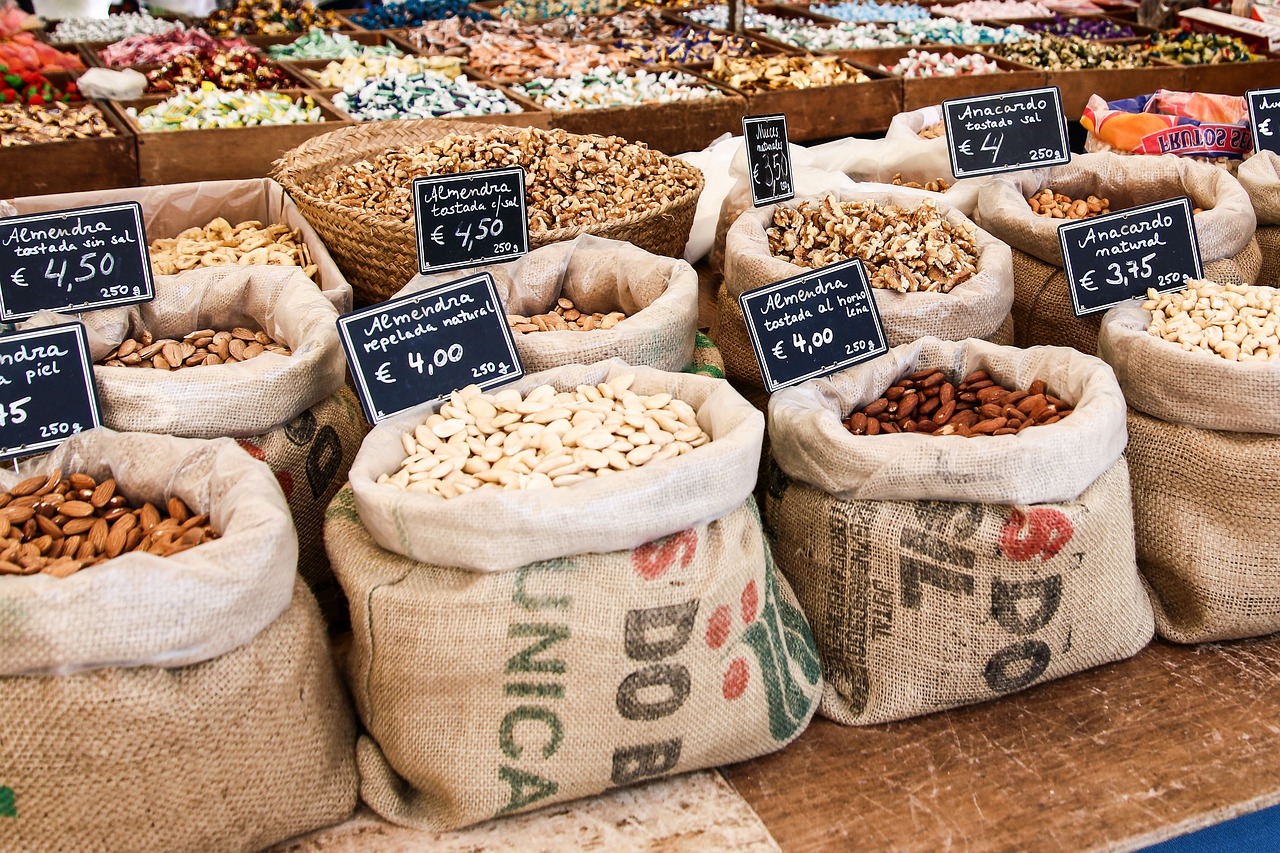
Factors Affecting the Spread
When it comes to trading, the bid-ask spread is a critical element that can significantly influence the cost of transactions for investors. But what exactly determines how wide or narrow this spread is? Several factors come into play, and understanding them can empower traders to make more informed decisions. Let's dive into some of the key elements that affect the spread.
First and foremost, market volatility plays a pivotal role. In a highly volatile market, prices can fluctuate dramatically within short time frames. This uncertainty causes market makers to widen the spread to protect themselves from potential losses. Imagine trying to catch a slippery fish; the more it wriggles, the harder it is to hold onto. Similarly, in volatile markets, market makers need a larger buffer to account for rapid price changes.
Next, we have trading volume. The more active a market is, the tighter the spread tends to be. High trading volumes indicate that there are plenty of buyers and sellers, which allows market makers to operate more efficiently. Conversely, in markets with low trading volume, the spread tends to widen because there are fewer participants, making it riskier for market makers to fill orders. Think of it like a busy restaurant versus a quiet one; when the tables are full, the waitstaff can turn over orders quickly, but when it’s empty, they have to be more cautious.
Another factor to consider is the specific asset being traded. Some securities are inherently more liquid than others. For example, blue-chip stocks typically have narrower spreads due to their high demand and trading frequency, while lesser-known stocks may have wider spreads because they are traded less frequently. It’s akin to shopping at a well-stocked supermarket versus a small corner store; the former likely has a variety of options and faster service, while the latter may struggle to keep items in stock.
Additionally, market sentiment can influence the spread. During times of uncertainty, such as economic downturns or geopolitical events, market makers may widen the spread as they anticipate greater risk. Traders tend to be more cautious, which can lead to decreased trading activity, further exacerbating the spread. It’s like walking on a tightrope; when the ground below feels unstable, you take wider steps to maintain your balance.
Lastly, the regulatory environment can also affect the spread. Changes in regulations can either tighten or loosen the requirements for market makers, impacting their operations and willingness to take on risk. For example, stricter capital requirements may lead market makers to widen spreads as they become more conservative in their trading practices. It’s essential for traders to stay informed about regulatory changes that could impact their trading costs.
In summary, the bid-ask spread is not just a random number; it’s influenced by a variety of factors including market volatility, trading volume, the specific asset, market sentiment, and regulatory conditions. By understanding these factors, traders can better navigate the complexities of the market and make more strategic decisions.
- What is the bid-ask spread? The bid-ask spread is the difference between the highest price a buyer is willing to pay for a security (the bid) and the lowest price a seller is willing to accept (the ask).
- Why is the bid-ask spread important? It affects the overall cost of trading. A narrower spread typically indicates lower trading costs, while a wider spread can increase the expenses for traders.
- How can I minimize the impact of the spread? Traders can look for highly liquid assets with tighter spreads, place market orders during peak trading hours, and utilize limit orders to control their entry and exit points.

Market Maker Strategies
Market makers utilize a variety of strategies to effectively manage risk and ensure that liquidity remains at optimal levels in the financial markets. These strategies are crucial because they help market makers respond swiftly to fluctuations in supply and demand, ultimately benefiting both traders and the broader market. One of the primary strategies employed by market makers is hedging. Hedging involves taking offsetting positions in related securities to mitigate potential losses. For example, if a market maker holds a significant inventory of a particular stock, they might enter into a futures contract to sell that stock at a predetermined price. This way, if the stock's price drops, the losses from the inventory could be offset by gains from the futures contract.
Another essential strategy is algorithmic trading. In today's fast-paced trading environment, market makers rely on sophisticated algorithms to execute trades at lightning speed. These algorithms analyze market data in real-time, allowing market makers to adjust their prices and inventory levels almost instantaneously. This not only enhances their ability to provide liquidity but also helps in narrowing the bid-ask spread, which is beneficial for traders looking to minimize their transaction costs. The combination of human intuition and machine efficiency creates a robust trading environment that can adapt to rapid market changes.
Additionally, market makers often engage in arbitrage opportunities. Arbitrage involves taking advantage of price discrepancies between different markets or related securities. For instance, if a stock is trading at a lower price on one exchange compared to another, a market maker might buy the stock on the cheaper exchange and sell it on the more expensive one. This practice not only helps to correct price inefficiencies but also contributes to overall market stability.
Furthermore, market makers maintain a careful balance of their inventory. They continuously assess their positions and make adjustments based on market conditions. This proactive management is crucial, especially during periods of high volatility when market conditions can change rapidly. By employing these strategies, market makers play a vital role in fostering a healthy trading environment, ensuring that traders can execute their orders with minimal delays and at fair prices.
In summary, the strategies employed by market makers—hedging, algorithmic trading, arbitrage, and inventory management—are all designed to enhance liquidity, stabilize prices, and facilitate smoother trading experiences for all market participants. These strategies not only protect the market makers themselves but also contribute to the overall efficiency and reliability of the financial markets.
- What is a market maker? A market maker is a financial intermediary that provides liquidity by continuously buying and selling securities, ensuring that there is always a market for traders.
- How do market makers make money? Market makers profit from the bid-ask spread, which is the difference between the buying price and the selling price of securities.
- What strategies do market makers use? Market makers use strategies such as hedging, algorithmic trading, and arbitrage to manage risk and maintain liquidity.
- Why are market makers important? They are crucial for ensuring liquidity in the market, allowing buyers and sellers to transact without significant delays or price impacts.

Market Makers vs. Other Participants
When you think about the bustling world of trading, it's easy to imagine a chaotic marketplace filled with buyers and sellers, each vying for the best deal. However, at the heart of this vibrant ecosystem are market makers, who play a role that is both unique and crucial. Unlike other participants such as brokers, institutional traders, or retail investors, market makers serve as intermediaries, ensuring that there is always a market for the securities being traded. They are the unsung heroes of liquidity, constantly ready to buy or sell, which allows the market to function smoothly.
To better understand how market makers differ from other participants, let's break down their roles:
- Market Makers: These entities provide liquidity by continuously quoting prices at which they are willing to buy and sell securities. Their primary goal is to facilitate trades and maintain an orderly market, regardless of external conditions.
- Brokers: Brokers act as agents for clients, executing trades on their behalf. They do not typically hold inventory like market makers do. Instead, they earn commissions for their services, which means their focus is on finding the best prices for their clients.
- Institutional Traders: These participants, including mutual funds and hedge funds, trade large volumes of securities. While they can influence market prices due to the size of their trades, they often rely on market makers to execute transactions efficiently without causing significant price fluctuations.
- Retail Investors: Individual traders who buy and sell securities for personal accounts. They usually depend on brokers and market makers to provide them with the liquidity and price quotes necessary to make trades.
In essence, market makers are the backbone of the trading ecosystem. They not only provide the necessary liquidity that allows other participants to buy and sell without delay but also help stabilize prices. Imagine a busy highway: if there are no traffic signals or signs, chaos ensues. Market makers are like those signals, directing the flow of trades and ensuring that everything runs smoothly.
Furthermore, market makers have a vested interest in maintaining a balanced market. They manage their inventory carefully, adjusting their quotes based on supply and demand dynamics. This active management contrasts sharply with the more passive roles of brokers and retail investors, who may react to market conditions rather than proactively shape them.
As we delve deeper into the trading world, it becomes clear that the relationship between market makers and other participants is symbiotic. Market makers rely on the volume generated by brokers and institutional traders, while these participants depend on market makers for liquidity and price stability. It's this intricate dance that keeps the financial markets vibrant and functional, allowing everyone to play their part effectively.
- What is the primary role of a market maker? Market makers provide liquidity by continuously buying and selling securities, ensuring that there is always a market for traders.
- How do market makers earn money? They profit from the bid-ask spread, which is the difference between the prices they buy and sell securities.
- Are market makers regulated? Yes, market makers are subject to regulatory oversight to ensure fair practices and protect traders.
- How do market makers impact price stability? By absorbing excess supply or demand, market makers help prevent extreme price fluctuations, contributing to a more predictable trading environment.

The Importance of Liquidity
Liquidity is a fundamental concept in the world of trading and finance, acting like the oil that keeps the machinery of the market running smoothly. Without liquidity, markets would be akin to a car sputtering on empty—inefficient and prone to breakdowns. So, what exactly is liquidity? In simple terms, it refers to the ease with which an asset can be bought or sold in the market without affecting its price. Market makers play a pivotal role in ensuring this liquidity, allowing traders to enter and exit positions swiftly and with minimal friction.
Imagine you’re at a bustling marketplace. If there are plenty of vendors ready to sell you fresh produce, you can quickly grab what you need without haggling over prices or waiting in long lines. This scenario mirrors how market makers operate in financial markets. They stand ready to buy and sell securities, thus ensuring that there are always buyers and sellers available. This constant availability is crucial, especially in times of market volatility when investors may want to react quickly to news or events.
One of the essential benefits of liquidity is that it helps to narrow the bid-ask spread, which is the difference between the price a buyer is willing to pay and the price a seller is asking for. A narrower spread means lower costs for traders, allowing more efficient transactions. Here’s a quick overview of why liquidity matters:
- Reduced Trading Costs: Higher liquidity often leads to tighter bid-ask spreads, which means traders pay less when buying or selling.
- Price Stability: Liquidity helps absorb shocks from sudden changes in supply or demand, preventing drastic price swings.
- Market Confidence: When liquidity is high, investors feel more secure in their ability to trade without impacting the market significantly.
Furthermore, liquidity is crucial during times of market stress. For instance, during economic downturns or crises, liquidity can dry up, making it challenging for investors to sell assets without incurring significant losses. Market makers step in during these times, providing the necessary support to stabilize the market. They act as a buffer, absorbing excess supply or demand and ensuring that trading can continue even in turbulent conditions.
To illustrate the importance of liquidity, consider the following table that compares liquid and illiquid assets:
| Aspect | Liquid Assets | Illiquid Assets |
|---|---|---|
| Definition | Assets that can be quickly bought or sold | Assets that take longer to sell |
| Examples | Stocks, Bonds, ETFs | Real Estate, Collectibles, Private Equity |
| Market Impact | Minimal price impact when trading | Significant price impact when trading |
| Trading Costs | Lower transaction costs | Higher transaction costs |
In summary, liquidity is not just a buzzword; it’s the lifeblood of financial markets. Market makers ensure that liquidity remains available, allowing for seamless transactions and fostering a healthy trading environment. As we move forward in an ever-evolving financial landscape, the importance of liquidity will only continue to grow, emphasizing the vital role that market makers play in maintaining market efficiency and stability.
What is liquidity?
Liquidity refers to how easily an asset can be bought or sold in the market without affecting its price. High liquidity means assets can be traded quickly and with minimal cost.
Why are market makers important?
Market makers provide liquidity by continuously buying and selling securities, ensuring that there is always a market for traders. They help reduce trading costs and stabilize prices.
How does liquidity impact trading costs?
Higher liquidity typically results in narrower bid-ask spreads, which lowers the costs for traders when entering or exiting positions.
What happens during a liquidity crisis?
During a liquidity crisis, the ability to buy or sell assets quickly diminishes, often leading to increased volatility and significant price changes. Market makers help mitigate these effects by providing liquidity.

Impact on Price Stability
When we think about the financial markets, one of the first things that come to mind is the constant fluctuation of prices. But have you ever wondered what keeps these prices from going haywire? Enter the market makers, the unsung heroes of trading who play a pivotal role in ensuring price stability. By continuously buying and selling securities, they act like a cushion, absorbing excess supply or demand that could otherwise lead to wild price swings.
Imagine a seesaw. On one side, you have buyers eager to purchase stocks, and on the other, sellers looking to offload their shares. Without market makers, this balance could easily tip, causing prices to soar or plummet. But with their presence, they help maintain equilibrium by stepping in when necessary. For instance, if there's a sudden surge in sellers, market makers can buy up the excess stock, preventing a drastic drop in price. Conversely, if buyers flood the market, they can sell from their inventory to keep prices from skyrocketing.
Moreover, market makers contribute to price stability through their management of the bid-ask spread. This spread is the difference between the price at which they are willing to buy (the bid) and the price at which they are willing to sell (the ask). A narrower spread often indicates a more stable price, as it reflects a higher level of liquidity. When market makers are actively trading, they can tighten this spread, making it easier for traders to buy and sell without incurring large costs. This is crucial for investors who want to enter or exit positions quickly without impacting the market price significantly.
To illustrate the impact of market makers on price stability, consider the following table:
| Scenario | Without Market Makers | With Market Makers |
|---|---|---|
| High Selling Pressure | Price drops sharply | Price remains stable |
| High Buying Pressure | Price spikes dramatically | Price increases gradually |
As you can see, market makers serve as a stabilizing force, helping to mitigate extreme price movements. This is particularly important during times of high volatility, such as economic downturns or major news events that can cause panic among investors. By providing a steady stream of liquidity, they ensure that the market remains accessible and functional, even when emotions run high.
In conclusion, the role of market makers extends far beyond just facilitating trades. They are essential in fostering a stable trading environment, which benefits all market participants. Their ability to absorb shocks and maintain liquidity is what allows investors to trade with confidence, knowing that they can buy or sell without fear of destabilizing the market. So, the next time you make a trade, remember the market makers working behind the scenes, ensuring that the financial playground remains safe and stable for everyone.
- What is a market maker? A market maker is a financial intermediary that provides liquidity by continuously buying and selling securities.
- How do market makers influence prices? They help maintain price stability by absorbing excess supply or demand and managing the bid-ask spread.
- Why is liquidity important in trading? Liquidity ensures that buyers and sellers can transact without significant delays or price impacts, leading to a more efficient market.
- What happens during high volatility? Market makers play a crucial role in stabilizing prices during volatile periods, preventing extreme fluctuations.

Market Maker Regulations
Market makers operate in a highly regulated environment, which is crucial for maintaining the integrity and efficiency of financial markets. These regulations are designed to protect investors and ensure fair trading practices. In many jurisdictions, market makers must register with regulatory bodies, adhere to strict capital requirements, and comply with reporting standards. This oversight helps to mitigate risks associated with market manipulation and ensures that market makers act in the best interests of their clients.
One of the key regulatory frameworks governing market makers is the Market Abuse Regulation (MAR), which aims to prevent insider trading and market manipulation. This regulation requires market makers to maintain transparency in their operations and report any suspicious activities. Additionally, they must adhere to the MiFID II (Markets in Financial Instruments Directive), which sets out rules for financial markets in the European Union, including requirements for best execution and transparency in trading.
In the United States, the Securities and Exchange Commission (SEC) oversees market makers, ensuring they comply with the Exchange Act. This act mandates that market makers must quote prices for a minimum number of stocks and maintain a certain level of liquidity in the market. The Financial Industry Regulatory Authority (FINRA) also plays a crucial role in regulating market makers by enforcing rules that promote fair trading practices and protect investors.
Regulations also address the capital requirements that market makers must meet to operate effectively. These requirements ensure that market makers have sufficient financial resources to absorb potential losses and maintain liquidity during periods of market stress. For instance, a market maker may be required to hold a certain percentage of their assets in liquid form, which can be quickly accessed to facilitate trades.
Furthermore, market makers must adhere to rules regarding conflict of interest. They are prohibited from engaging in practices that could disadvantage their clients, such as front-running, where a market maker executes orders on a security for its own account before executing orders for its clients. This regulation is vital for maintaining trust in the market and ensuring that all participants are treated fairly.
In summary, the regulations governing market makers are essential for fostering a fair and efficient trading environment. These rules not only protect investors but also ensure that market makers can operate effectively, contributing to overall market stability. As the financial landscape continues to evolve, it will be interesting to see how regulations adapt to new challenges and technologies.
- What is a market maker? Market makers are financial intermediaries that provide liquidity by continuously buying and selling securities, ensuring there is a market for traders.
- Why are regulations important for market makers? Regulations help maintain market integrity, protect investors, and ensure fair trading practices.
- What are the main regulatory bodies overseeing market makers? In the U.S., the SEC and FINRA regulate market makers, while in the EU, the MAR and MiFID II frameworks are key.
- How do capital requirements affect market makers? Capital requirements ensure that market makers have enough financial resources to absorb losses and maintain liquidity during market fluctuations.

Future of Market Making
The future of market making is poised to undergo significant transformation, driven primarily by technological advancements and evolving market dynamics. As we look ahead, it’s clear that market makers will need to adapt to a rapidly changing landscape, integrating new technologies while maintaining their essential role in providing liquidity. One of the most exciting developments on the horizon is the rise of algorithmic trading, where sophisticated algorithms analyze vast amounts of data in real-time to make trading decisions. This not only enhances speed but also improves accuracy in pricing, which is critical for market makers.
Moreover, the advent of artificial intelligence (AI) is set to revolutionize how market makers operate. AI can help in predicting market trends and managing risks more effectively. By utilizing machine learning models, market makers can analyze patterns in trading data that humans might overlook, allowing them to adjust their strategies proactively. This shift towards automation means that market makers will be able to respond to changes in the market almost instantaneously, which is crucial in the fast-paced world of trading.
Another trend influencing the future of market making is the increasing importance of cryptocurrencies and decentralized finance (DeFi). As these markets grow, traditional market makers will have to navigate new challenges and opportunities. For instance, the volatility often seen in cryptocurrency markets presents both a risk and a chance for profit. Market makers will need to develop new strategies tailored to these unique characteristics, ensuring they can provide liquidity even in these less stable environments.
Furthermore, regulatory changes will play a significant role in shaping the future of market making. As regulators around the world continue to scrutinize trading practices, market makers will need to remain compliant while still being able to operate efficiently. This may lead to the development of new compliance technologies that help market makers navigate complex regulations without sacrificing performance.
In summary, the future of market making is bright but filled with challenges. Market makers who embrace technology, adapt to new financial instruments like cryptocurrencies, and stay ahead of regulatory changes will not only survive but thrive in the evolving landscape of trading. The ability to provide liquidity efficiently and effectively will remain the cornerstone of their role, ensuring that they continue to be indispensable players in the financial markets.
- What is a market maker? A market maker is a financial intermediary that facilitates trading by providing liquidity in the markets, continuously buying and selling securities.
- How do market makers affect trading? Market makers ensure that there is always a buyer and seller for securities, which helps maintain liquidity and price stability.
- What technologies are changing market making? Technologies such as algorithmic trading and artificial intelligence are transforming market making by improving speed and accuracy in trading.
- What role do regulations play in market making? Regulations help ensure fair practices among market makers, protecting traders and maintaining market integrity.
Frequently Asked Questions
- What is a market maker?
A market maker is a financial intermediary that facilitates trading by continuously buying and selling securities. They ensure there is always a market for traders, providing liquidity and enabling smoother transactions.
- How do market makers impact liquidity?
Market makers play a crucial role in maintaining liquidity in the markets. By being ready to buy or sell at any time, they allow buyers and sellers to transact quickly and efficiently, reducing the chances of significant price fluctuations.
- What is the bid-ask spread?
The bid-ask spread is the difference between the price a market maker is willing to pay for a security (the bid) and the price at which they are willing to sell it (the ask). This spread is a key indicator of market liquidity and trading costs for investors.
- What factors influence the bid-ask spread?
Several factors can affect the bid-ask spread, including market volatility, trading volume, and the specific asset being traded. Higher volatility and lower trading volume typically widen the spread, impacting market maker profitability.
- What strategies do market makers use?
Market makers employ various strategies to manage risk and ensure liquidity, such as hedging and algorithmic trading. These strategies allow them to respond quickly to market changes and maintain efficient trading conditions.
- How do market makers differ from brokers?
While both market makers and brokers facilitate trading, market makers actively buy and sell securities to provide liquidity, whereas brokers act as intermediaries between buyers and sellers, earning commissions on trades.
- Why is liquidity important in trading?
Liquidity is vital for efficient trading because it allows transactions to occur quickly without causing significant price changes. Market makers help ensure that liquidity is available, making it easier for traders to enter and exit positions.
- How do market makers contribute to price stability?
Market makers contribute to price stability by absorbing excess supply or demand in the market. This helps prevent extreme price fluctuations, creating a more predictable trading environment for investors.
- What regulations govern market makers?
Market makers are subject to various regulatory frameworks designed to ensure fair practices in trading. These regulations help clarify their responsibilities and provide protections for traders to promote a fair and transparent market.
- What is the future of market making?
The landscape of market making is evolving due to technological advancements and changing market dynamics. Market makers are adapting to these trends, incorporating new technologies and strategies to maintain their essential role in the markets.

